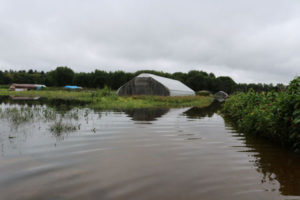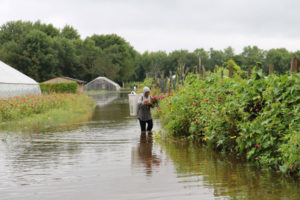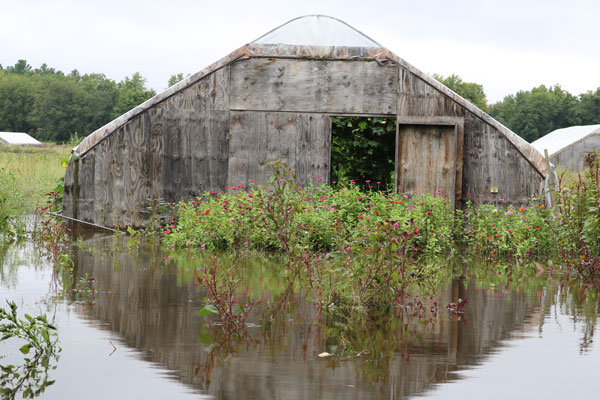History and Conservation Coming Together: Gaining Knowledge to Farm
This blog is from World Farmers' Intern Blog Series, featuring reflections written by 2017 and 2018 summer high school interns from Nashoba Regional High School. To read the full series, visit our blog page www.worldfarmers.org/blogs, and stay tuned! We will release a new blog in the series on alternating Fridays in February, March, and April, 2019.
History and Conservation
Coming Together:
Gaining Knowledge to Farm
By Hanna King, Nashoba Regional High School Summer Intern, Summer 2017
Can an academic historian and a conservation specialist from an environmental group have anything to offer the refugees and immigrants who farm at Flats Mentor Farm? The staff and summer interns at World Farmers decided to test that notion by inviting Brian Donahue and Al Futterman to visit Flats Mentor Farm on July 14, 2017. Dr. Donahue is an environmental history professor at Brandeis University and a long-time farmer. Al Futterman currently serves as the land programs and outreach director for the Nashua River Watershed Association, leading both the Greenway Program and Land Protection Program. Both men visited the Flats to learn about the farm and determine if they could offer insight in managing flooding from the Nashua River or assist the organization in other ways. Maria Moreira, founder of Flats Mentor Farm, and Executive Director of World Farmers, provided a history of the farm prior to Brian’s and Al’s visit. She explained the process she went through to obtain the land, and she explained her goal of gaining more land for farmers. Flats Mentor Farm is located on the “intervale” or floodplain of the Nashua River. Heavy rains this year delayed land preparation and the crop production for farmers. Prior to Dr. Donahue’s and Al Futterman’s visit, staff observed that downed trees in the river diverted water onto the farm. In addition, they noted how changes in rainfall patterns and the development of upstream environments and neighboring parcels contribute to more frequent flooding. Brian Donahue made an immediate connection between the downed trees and problems he, as a farmer, has faced on his own land. He also discussed the strategies used by colonial farmers to ditch land along rivers to provide drainage for meadows or hay fields and for more intensive vegetable cultivation. As the group made its way to the back corner of the farm, the group discussed changing land uses over time and that the return of beavers complicates farming in floodplains.
or assist the organization in other ways. Maria Moreira, founder of Flats Mentor Farm, and Executive Director of World Farmers, provided a history of the farm prior to Brian’s and Al’s visit. She explained the process she went through to obtain the land, and she explained her goal of gaining more land for farmers. Flats Mentor Farm is located on the “intervale” or floodplain of the Nashua River. Heavy rains this year delayed land preparation and the crop production for farmers. Prior to Dr. Donahue’s and Al Futterman’s visit, staff observed that downed trees in the river diverted water onto the farm. In addition, they noted how changes in rainfall patterns and the development of upstream environments and neighboring parcels contribute to more frequent flooding. Brian Donahue made an immediate connection between the downed trees and problems he, as a farmer, has faced on his own land. He also discussed the strategies used by colonial farmers to ditch land along rivers to provide drainage for meadows or hay fields and for more intensive vegetable cultivation. As the group made its way to the back corner of the farm, the group discussed changing land uses over time and that the return of beavers complicates farming in floodplains.

As the visit came to an end, Al Futterman and Brian Donahue were grateful for the opportunity to learn about the farm. Al is planning to develop a video that features an interview with Maria Moreira and describes some of the flooding challenges. He hopes to be able to use the video to inform others and generate solutions to land limitations. Brian made some helpful suggestions for improving water flow and drainage on the farm. The visit proved that unlikely partnerships can bear fruit for small farms. Both Brian and Al demonstrated the adage that learning and understanding comes not just through reading and abstract learning, but through similar experiences. Al’s degree in rural sociology from Cornell, his long work in the Nashua River Watershed, and his experience recording farmers’ stories enable him to bring support and suggestions to the farm. Brian’s work as a farmer and the research he conducted to write the book, The Great Meadow, about the history of farming in the floodplains of the Concord and Sudbury rivers allow him to take a broader historical view of these challenges. We hope that these types of partnerships will continue for the benefit of the farm, the farmers, and the broader community.

